#it expects the audience to do their own critical thinking
Text
Enough for now.
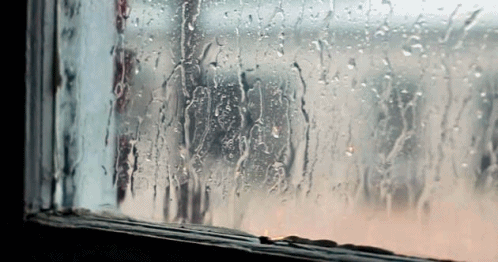
°•○Placeholder for banner to be added○•°
Fandom : Honkai: Star Rail
Rating : General Audiences, SFW
Pairing : Dr. Ratio & Reader
Dynamic : Friendship
Tags : Hurt/Comfort, Emotional Hurt/Comfort, Gender Neutral Reader
Summary :
"I do not think any of it, not the way you do."
"Sure."

"Perhaps it would be smarter if you followed my advice from earlier, you stubborn one. Really, you're simply just being a-"
"An idiot ?" You cut off Ratio, uncaring tone speaking volume of your tired abandon of fighting back. "Good for nothing ? Useless ? Clown ? Stupid ? Lazy, unable to just understand anything, or even, aeons forbid, a fool destined to end up under a bridge ?" You scoffed with no energy put into it. "I've heard it all doctor, you'll have to get more creative. And I have my own way of doing things. You're not helping right now."
Silence answered you, as half-expected, the other one being a scoff or pissed off, venomous rebuttal.
Instead, as you continued fretting with your organization of the mess in front of you, a hand stilled your arm, strong and warm but gentle.
"I do not think any of it, not the way you do. Yes, you appear quite the fool at times, on occasions, but in no way that would warrant such description." Ratio's voice was firm, feelings hidden under a veil of reprimand that weirdly didn't feel diminutive somehow. "I wish you were not so cruel."
Your cheek twitched from the angry sneer that threatened to break out. "Ah yes, my apologies, I won't defend myself from the onslaught of comments thrown my way the way thrown to a misbehaving dog."
"...I wish you were not so cruel to yourself." The doctor rasped, emotions finally sleeping through his tone.
You grew tired at his admission, but shrugged, apathy winning over anything else.
"I do not see you as a dog to bark comments and critics at. Nor do I wish to see you see yourself as such either."
"Sure."
He opened his mouth, then paused, closed it, and took some time to gather his thoughts, hand not leaving your arm, still gentle in its hold.
"...I will adjust the way I speak to you. I will ensure it does not sound as if I were ordering a dog around, and if it does, I will aim to better it further." Ratio spoke, voice low, decisive.
You said nothing.
"I think nothing you've mentioned towards you. None."
You said nothing.
"Those before I, that hammered those beliefs to the point you would fully believe I think so as well- I despise them all."
This time you scoffed.
"I do." Ratio reaffirmed. "Beating someone to believe only those things, to take away their trust in their skills and competences, in simply trying as well- I despise that. With all my being. That is not teaching anything. It is taking away a person's control of their will to try. To learn. To act." His hands shifted so his thumb could press faintly to the inside of your wrist.
"I do not agree with it. I despise it. I am harsh, I will easily admit it. But if it only ends in taking away your wills, then I shall adjust myself to aid in your ascent to betterness, learning, and finding once again what has been taken from you."
You said nothing, but you nodded.
That was enough, for now.

#my writing#hsr x reader#honkai star rail x reader#dr ratio x reader#hurt/comfort#friendship#gender neutral reader#platonic
69 notes
·
View notes
Note
What are your headcanons about Marcille's mom if you have any? It's interesting that what drew Donato to her was cause she lived the history he studied, or that was said somewhere at least. She must've had an interesting life.
so this was going to be just a normal answer but then I realized I have a Lot of Things To Say. so here goes, a compilation of what we know for a fact from the canon, what I've extrapolated from the visual cues and details, and my theories based on all of that.
Things we know for a fact about Marcille's mother because they were explicitly stated in the manga and supplemental materials:
She was a court mage for a Tall-man kingdom at the southern part of the Northern Continent
Donato, a court historian, fell in love with her because she had lived through the history he was studying, and he courted her for 17 years (age 15 to 32) before getting married
She was a cheerful person who rarely showed extreme emotion and took things as they came
She always cooked a huge meal for Marcille on her birthdays
She remarried a gnome after Donato's death and a short distance away from Marcille's childhood home
Pipi, Marcille's pet bird, was actually older than Marcille and originally belonged to her mother (bird died at 62)
She was extremely heartbroken when Donato died and ultimately ended up instilling a deep fear of mortality in Marcille with her words
the only time she showed extreme emotion in front of her family was when Donato could no longer eat his favourite dish near the end of his life.
She scolded Marcille for being cruel to ants (implying she can have a stern side when needed)
Things that are explicitly shown but mostly through visual cues
She has a very distinctive style of dress always involving a ribbon choker (mirroring Marcille's habit of always wearing a matching choker with any of her outfits that don't cover her neck)
She was almost stereotypically good at housekeeping and traditionally "wifely" things (very frequently depicted wearing an apron or doing some domestic chore when not at work, seems to have been an avid cook).
She knits? (also, note the affectionate smile as she's looking at Donato and Marcille reading a book together in the full panel)
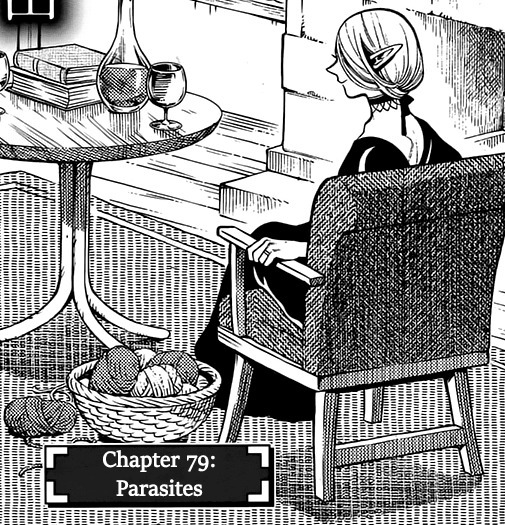
She was as excited for Marcille's milestones as Donato was.
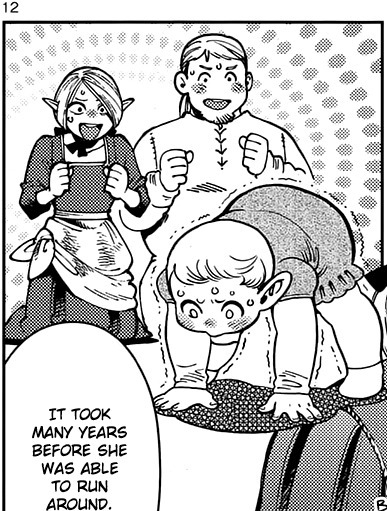
She didn't tell Marcille much about elven food
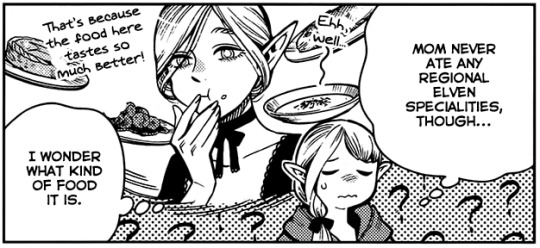
(there are a couple things that this panel in particular implies:
She lived a good deal of her life (if not being born and raised) in a mainly elven country in the West, implied by her knowing enough of an elven region's cuisine to prefer Tall-man food over it
seems to have a pretty carefree and casual demeanour overall, if this is how she replied to Marcille asking her about it (sounds like she never gave her culinary preferences that much thought to begin with)
slightly related to number 2, it seems like she and Marcille had a fairly casual parent-child dynamic (especially in comparison to the Toudens' memory of their father)
(local elf tastes Italian food once and never goes back))
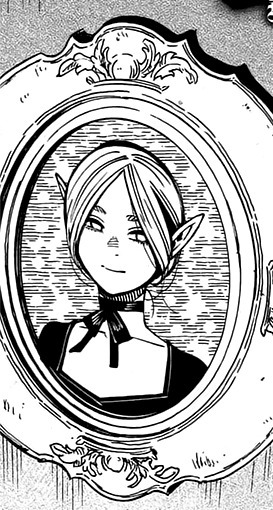
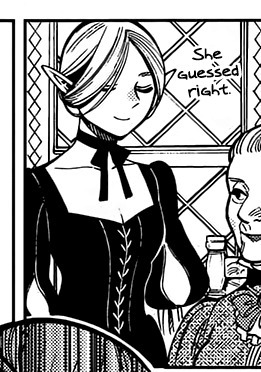
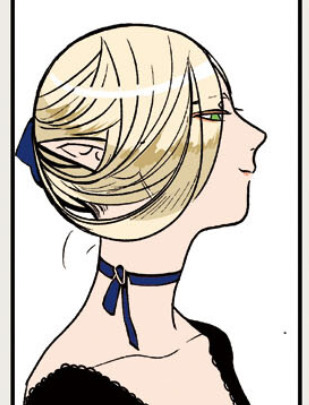
However, she seems a lot more... serious in most of the other times we see her? Almost like the very stereotypical archetype of a graceful elf.
Subsequent conclusions about her personality:
Usually pretty carefree and cheerful at home, has been a loving and attentive parent throughout Marcille's childhood (while not being so doting that she didn't discipline Marcille).
Slightly more conjectural theories on her personality:
Had a much more graceful and professional personality at work, which would explain the more serious portraits we see of her.
Given that both she and Donato had positions at the royal court, it seems a little odd that she'd go out of her way to do all the housework herself, so maybe she just enjoyed doing it?
Now taping all the evidence together and toeing the line between analysis and fanfiction:
It's clear that she loved Donato very much and was utterly devastated by losing him. But there's one thing that really stuck out to me in what little we see of her:
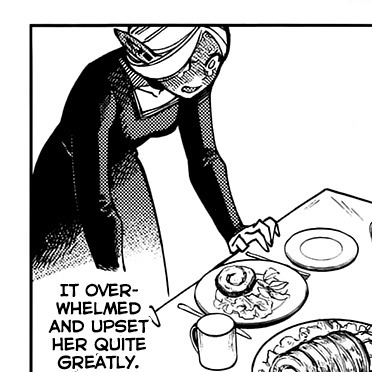
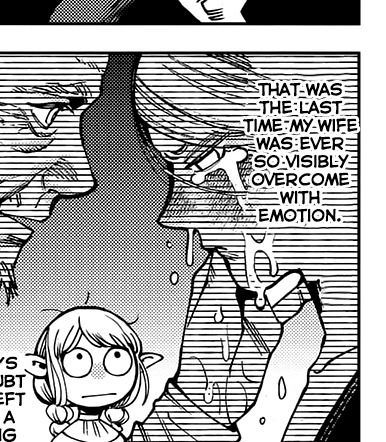
Doesn't she seem... angry? The way she's gritting her teeth, clutching the tablecloth, and how this is the first and only time we see her eyes opened that wide. In the following panel, you see her being quiet and dejected after her initial outburst. She's still crying very intensely, but her brows are furrowed, and she's not really responding to Donato's affection in her body language.
We're not told the details of how she felt about losing Donato other than that it upset her. But this, to me, implies that she was angry and resented that he was aging, that the end of his life was approaching. An "it's not fair" type of preemptive grief. And if this was the first and last time she cried like this in front of her family, she was either very good at coping in private... or very bad at letting herself feel unpleasant emotions until they become unavoidable and end up overwhelming her.
It's not too remarkable a detail on the surface. It's even reminiscent of what the audience has seen of Marcille. But... when it comes to the big picture, you'd think an elf who voluntarily chose to marry a tall-man and have a half-elf child would have been better prepared for this.
It kind of recontextualizes her cheerfulness to me.
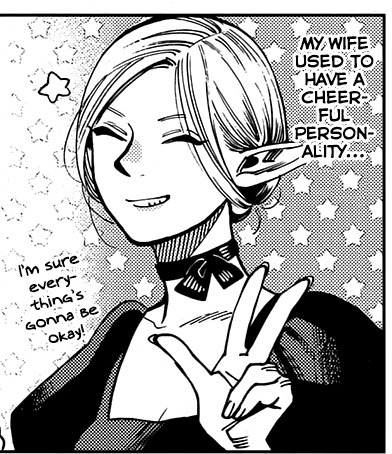
"I'm sure everything's gonna be okay!" (or some variation thereof, depending on what translation you have).
And this is stated to contrast her extreme grief when finally confronting Donato's failing body and eventual death. But I'm wondering if... maybe this optimism was why she was so upset. What if she went into all of it thinking "everything's gonna be okay"? What if she was a little young by elven standards, and just followed her heart thinking that her own resilience would get her through anything?
Of course, only to get completely overwhelmed when she actually loses Donato. She turns into a completely different person. And that's heartbreaking on its own-- but what the audience sees is the effect it had on Marcille. Can you imagine being her, watching your invincible and upbeat mother suddenly lose all the light in her eyes in one go?
I've already made a huge post about how I think Marcille models her "work persona" off her mother, but another thing that stuck with me as I was looking for more details in the manga was this:
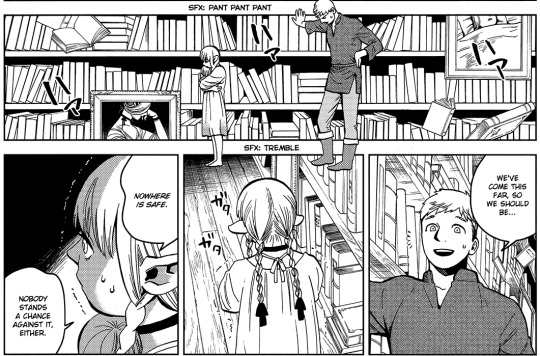
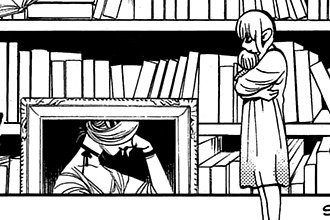
copy pasting from the other post i made about it lmao it's like... the second she resigns herself to lifelong pain and terror, there's another portrait of her mother facing her like this. with their heads bowed, in mirrored body language of resignation and despair and sorrow. Except it's posed like Marcille is still looking at her mother but her mother is looking away.
It took me a second to realize, but I think that it's a visual metaphor for the fact that Marcille's mother was the only long-lived role model she had-- and she failed to model healthy grief for her daughter. I don't say this as an accusation or to disparage her as a character, but just as a matter of fact. In her, Marcille was seeing herself older and losing a short-lived spouse or loved one of her own, and all she saw was hopelessness.
But her mother didn't mean to instill hopelessness and terror in her. She wasn't really thinking of how it would truly affect Marcille at all (at least, that's how I'm interpreting her looking down and away from Marcille in the metaphor), she was just sad. And she, in her own way, was trying to protect her daughter and help her prepare for future losses.
What she meant was "loss is inevitable, and you have to learn how to be in pain but live on anyway." What Marcille heard was "loss is inevitable, and you will be scared and hurt for the rest of your life."
Again. Marcille's mother doesn't feature explicitly in the story the way her father does -- but in so many ways, her shadow, her silhouette, her reflection is always hanging over Marcille.
All that to say... headcanon-wise (everything from here on is 100% without evidence lmao), I'd like to think that she matured and realized that she failed Marcille. I imagine her being regretful about it, wanting a chance to fix it but never finding a way to insert herself back into Marcille's life when Marcille is so so so busy becoming the most accomplished mage possible. I imagine her being herself again, now, so many years after her loss and after remarrying -- but with her cheerfulness tempered with a lot more wisdom and the pain of having gone through loss like that. I think the second Marcille actually tells her what happened in the dungeon, she'd want to go running to her daughter again -- if Marcille tells her the full truth instead of just being embarrassed she let things get that far. (oh, the tragedy of her wanting to be more like her mother and an accomplished adult who doesn't need to be babied... being embarrassed to actually tell her mother how much she fucked up...)
There's also the tension of her having remarried -- I know that there's at least a little bit of resentment that Marcille harbours about that, because she's childish like that at heart even if she makes an effort not to externalize it. I think that her mother would be aware of that, potentially adding to her sense of guilt and apprehension at trying to reappear/intrude on Marcille's life. I honestly don't think Marcille has met her stepfather -- or even considers him a stepfather rather than "mama's new husband" and kind of a total stranger. I think she and her mother actively don't talk about it in their correspondence, like an elephant in the room.
but, ultimately, I think her mother is on her side no matter what. Ancient magic? Dark necromancy? Sure, she'll feel guilty and like she was partially responsible for setting Marcille down such a painful path, but she wouldn't care. that's her daughter!! she would've moved back west and been petitioning for her at the court, buying a house right next to the Canaries barracks and visiting her every day that she wasn't on a mission. And if her husband had opinions on Marcille becoming a "dark arts user," he either gets over it or it's divorce with him. Yes, she might have had her optimism completely humbled by losing Donato like that -- but she's still headstrong and self-assured and she doesn't care what people think of her. It's her way or the highway and she's always going to be in Marcille's corner.
(She also needs a name lol. I went with Juno, just to be cute about "Marcille"s closest real life equivalent being Marcella, which is the female version of Marcellus, which in turn is a diminutive of Marcus, which was derived from Mars. Absolutely in love with Marcille potentially being named after Ares/Mars the fucking god of war btw)
#asks#she could easily be interpreted as distant or neglectful after Donato's death too#with how little involvement she has in Marcille's life/the fact that Marcille doesn't even mention her when talking about her life prospect#and that's fair! I will argue to hell and back that she was a loving parent when Donato was alive#but there's nothing that suggests she remained a loving parent afterwards#I just think that like... parental relationships are so complicated in dungeon meshi#you cannot deny that the toudens' mother loved them dearly but that she failed them both miserably as a parent#and i think it'd be more compelling if Marcille's mother was a little like that too#not a totally and easily dismissable deadbeat#but someone who truly loves her daughter but was only human herself and couldn't be what Marcille needed at a crucial moment#and regrets it deeply#and that the distance between them is mutually self-imposed by complicated feelings of guilt and fear#and a little resentment from Marcille's side that she hasn't really properly processed#I don't know if I'll ever get around to writing it but i had this idea where Marcille does finally spill the beans to her mom and she just#immediately arrives in Melini#and its awkward for a bit but they do finally have a heart to heart and air it all out#and marcille starts freaking out that her marriage is rocky rn bc her new husband wants her to distance herself from marcille#on account of the crimes and all#marcille's like no you can't blow up your marriage for me and her mother just shuts that shit down#'you didn't choose to be born. i was the one who made that choice for you'#'i brought you into this world and i'll be damned if i don't take responsibility for that the entire way'#'you are entitled to *nothing less* than my unconditional love.'#and obviously that's not a sentiment that's exactly healthy as a universal statement about parenthood#but i think its what her mother would believe and what marcille needs to hear#and dungeon meshi does such a fantastic job at just... letting imperfect things just *be* without having to justify it immediately#it expects the audience to do their own critical thinking#and know that its not trying to make sweeping universal statements in every instance#marcilleposting#marcille donato
36 notes
·
View notes
Text
Thomas Sanders is still out there not making a season 2 finale . . . .
#like i don’t expect him to do it#which is why I unsubscribed ages ago#like it’s been over a year#since I unsubscribed#but dude#if you just wanted to dress up#and make silly one off vids#WHY#why on earth did you make#big complicated plotlines#your audience got genuinely invested in#you’re letting everyone down#more so by not owning up to it#ts criticism#i think Thomas is a dick
5 notes
·
View notes
Text
seeing people consider their own critical thinking skills in response to Plagiarism and You(tube), i'd like to share the SOAPSTone analysis framework i learned in AP lang & comp.
Speaker: who is this person? what are their credentials? any obvious motivations, personal or financial?
Occasion: when did the speaker say/write this thing? yesterday? a decade ago? was it for a specific event, or perhaps part of a larger series?
Audience: who did the speaker expect their message to reach? a certain age group? a specific fanbase? people with certain political opinions?
Purpose: why did the speaker say/write what they did on this occasion? what did they want the audience to think or do in response to their message?
Subject: what is the speaker talking about? is there a reason to take them seriously on this topic? why did they bring it up on this occasion?
Tone: how did the speaker choose to address their target audience? as a friend? a supplicant? an authority? why did the speaker choose this tone?
#was gonna write an example using this framework to describe hbomberguy's video but YIKES i should be asleep in bed already#i'd describe his tone as a combination of professional outrage and heartfelt grief though#suz yells#hbomberguy#plagiarism and you(tube)#critical thinking
995 notes
·
View notes
Text
The more I think about season 2, the more grateful I am.
In a lot of ways, OFMD's writers, cast, and crew were given an almost impossible task. S1 was brilliant and took everyone by surprise by how successful it became. I am still shocked every time I rewatch by how smart and efficient the writing is, how intelligent the social commentary. S1 is a masterclass in good television.
And for s2, expectations were incredibly high. OFMD found massive word-of-mouth success in a way I've never seen with any other show, and they suddenly had a big, incredibly passionate audience - the renewal was because of massive fan support, and that must have translated to an incredible amount of pressure in the writer's room. Plus, as if that wasn't enough on its own, they're having to deal with budget cuts and Max slashing them down to only 8 episodes to tell a 10-episode story. This is an incredibly daunting task.
And yeah, I've been critical. OFMD is my favorite show, no contest, and it's easy to be critical of the things we love. We can all see that the pacing was off this season, especially in those last two episodes. Some arcs felt rushed; some side characters didn't get enough screen time to set up what they're doing this season. Jim and Olu especially suffer for that. It's inexcusable that this show's budget was slashed the way it was and I'm sad for what we could have had.
But, on the whole? Holy shit, this season was incredibly successful! Despite an incredible amount of fan pressure, the writers told the story they wanted to tell. They never lost sight of Ed and Stede's story, and were smart about allocating screen time so our leads' arcs never suffered too much for it. There's so much creative problem solving - when they realized they'd need to be smart about which side characters to keep on screen, they turned Buttons into a bird in a way that underscored season themes of transformation and change. 10/10, no notes. They even remembered their audience and left us on a satisfying note for all our characters - we get to end with Ed and Stede, happy and together, starting their new life.
They had an impossible task and they did a fucking commendable job. Character beats and humor are balanced amazingly well. Ed and Stede feel so much more fleshed out this season. Just like in s1, OFMD will never be a show where you can catch everything with one watch - there's so many little jokes, hidden gags, small details to discover with every rewatch. And every single actor is giving it their all in every scene! You can tell how much this show was a labor of love for everyone involved.
I'm proper fucking impressed. Here's hoping they get a renewal and a better budget for season 3!
817 notes
·
View notes
Text
actually I think it is worth talking about this since I am ostensibly a writing blog and we all like to chat about the craft. it is invaluable (both as a writer and a reader) to understand how art (or propaganda) relates to real-world violence and it is critical to have a strong grasp on how systemic discrimination can be reflected in art and perpetuated by it to an under-informed audience that may already be influenced by unchallenged violent beliefs. but when people start giving prescriptive creative limits in the vein of "you MUST depict this topic THIS specific way" or "you CANNOT depict these specific actions" then that's literally just a creative policing with no value to anyone. it will not educate people and it will prevent interesting art from being created. like, there will always be executions of those "taboo depictions" that will subvert expectations (look at tender is the flesh or lolita). it's literally just a skill issue and people projecting their own creative limits on you when they forbid certain content. they lack creative vision and that's not your problem.
and you know. even if you come across literally the least subversive depiction possible of something taboo in someone's wish fulfillment fantasy, this is still not an indication that the authors or audiences would ever condone or enjoy the depicted events in real life, especially in the absence of metatextual evidence to suggest it. (in fact, usually if you're warning for things then it's metatextual evidence against it! since it's a warning!). when people make the claim that this content is indicative of your real life behaviors, this is them projecting their moral code and reading preferences on you. this is, again, not your problem and will do nothing other than censor potentially interesting art.
247 notes
·
View notes
Text
On Aziraphale, Protection, and the Greater Good
Alright folks. I’ve already written quite a bit about the ways the Metatron was trying to manipulate Aziraphale here, but I wanted to give credit where credit is due and talk a little bit about how I don’t think that necessarily means it worked nearly as well as the Metatron thinks it does.
Because Aziraphale? Is not stupid. It’s one of his defining traits that though he might occasionally be slow, he has always been intelligent. He has also always been a fighter. And a bit stubborn. And though the fact he is allowed to be all that and still stay soft is one of my favorite things about him, that does not mean he is soft and soft alone.
With or without Crowley, Aziraphale has nearly always been a character who, above all else, does what’s right. This is part of what Crowley loves about him and it’s part about what we as the audience love about him too. He shelters a demon on the wall he is meant to be guarding. He gives away a sword to humans and lies to God about it directly to Her face. He struggles immensely with being asked to do anything he cannot reconcile with his morals and, even if he might fight against his impulses as to what’s right for a little bit, when push comes to shove he almost always falls on the right side of that scale. It’s important especially that this is also true of him even without Crowley in the equation.
Now, Crowley makes it much easier for him to be this person. He encourages and enables Aziraphale to be himself. He complicates and challenges Aziraphale’s worldview but in a healthy way that helps him grow and develop it, but never forces Az to be someone he isn’t. He also, most importantly, gives Aziraphale someone he understands. He is a connection. And a connection that allows Aziraphale to take his time and to make the excuses he needs to, at least for a little while. Because he understands that while Aziraphale is slow to change, he is not as resistant to it as he often reads to be - especially when he thinks that change can benefit the greater good.
Because Aziraphale fundamentally loves Earth and the people on it. And he knows beyond a shadow of a doubt that Crowley does too. Not taking an opportunity he has to help someone has never sat well with him - even if that person is a naked Gabriel showing up on his doorstep. He does not run away with Crowley in season 1 because it would have been wrong to run away when he felt he could help and the same principle applies here too with the decision he comes to about the Metatron’s offer.
While I definitely think the Metatron was using lovebombing and other manipulation techniques on Aziraphale I highly suspect he is underestimating his new Supreme Archangel. And I highly suspect that what is happening here is not Aziraphale folding back into this own cult as much as much a few other things that could be happening.
I may poke around at a few more of these later but for now I want to focus on Aziraphale lied theory laid out here by @las-lus. This whole season has focused quite a bit on Aziraphale lying/using sleight of hand for Crowley's sake. It makes sense he would do this too to protect him from the Metatron and critically I don’t think it’s an accident that the only shot we get of his conversation with the Metatron are flashbacks from Aziraphale's narrative point of view. Reading this actually changed the whole trajectory of this meta so please take a look at it if you've got the chance! I really love this theory a lot and would've slapped this all on a reblog if it wasn't so big. (Though I'll be the first to admit I'm biased to anything that lets Aziraphale do some rescuing.)
At it's core this makes this action a protective one. He is a guardian given a flaming sword by God. He was built to protect. And we see him in this role throughout the series even if it's not always in the way we expect or in the way he was necessarily built for.
I want to start before the beginning. This scene is an important one for a lot of reasons, but for the context of this the important bit is that Aziraphale is already anxious. He’s a bit starstruck and a little baffled by the strange angel he’s stumbled into chatting with, but his primary focus in the meat of this scene is actually concern for this stranger's welfare. The instant the topic turns critical he immediately starts glancing around anxiously. This scene ends with him saying, "I'd hate to see you getting into any trouble." and giving us one of the most worried expressions I've ever seen on his face.
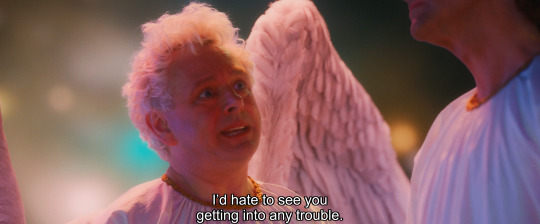
Then again at Eden, the first time we meet Aziraphale, we are shown him acting twice in a row for the sake of keeping others safe. We see him offer Crowley shelter from the storm and also give away his God given weapon to protect Adam and Eve. A lot of people tie Crowley to Eden for obvious reason but I think people often forget that, yes, without Crowley humans don't leave Eden but without Aziraphale they do not survive it.
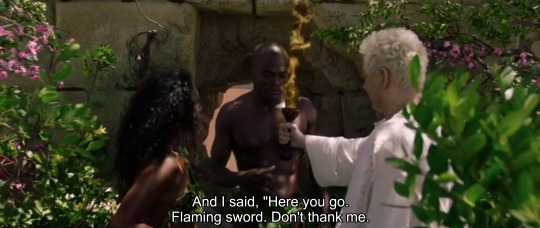
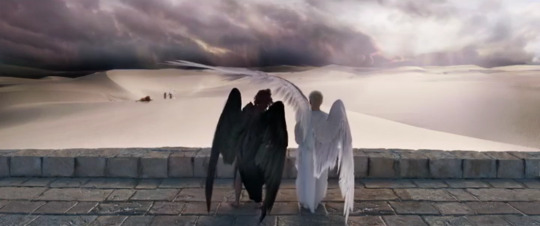
We then see him in conflict over the Flood. As far as we know he doesn't act here but he quite clearly thinks it is wrong. He's high strung and tense and his attempts to rebuke Crowley's frustration feels more like him trying to convince himself.
Now we get to Job. This minisode is so fascinating to me for a lot of reasons because through most of it, against pattern, we have Aziraphale as the driving force throughout it. First we get Aziraphale checking in with Heaven to make sure there wasn't some official solution to this. (We also get a line in there that I think says a lot about Aziraphale's priorities when he specifically draws attention to his concerns for Sitis being old enough birth that many times would be hard and risky.) Once Heaven fails him here Aziraphale is the one to reach out to Crowley and Aziraphale is the one to press for them to work together. He takes a gamble, hoping that his instinct that Crowley does not want to hurt kids is accurate, and gets up in Crowley's face to challenge him when Crowley refuses to prove him right. It is not Crowley taking the lead here, bringing Aziraphale in but rather Aziraphale trusting his owns instincts are right.

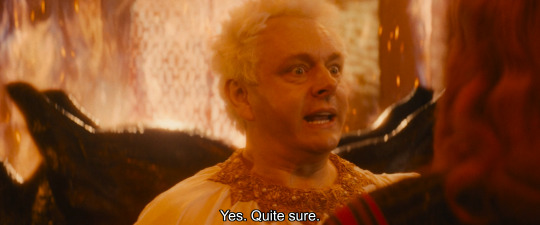
Aziraphale is also crucially the one constructing the charade Crowley plays in front of the angels as Bildad the cobbler/midwife. Aziraphale immediately and without hesitation provides Crowley with the pieces he needs to make the lie convincing enough. He tells him that what they need is an expert on human births and Crowley rolls with it and then clarifies very quickly that Gabriel witnessed Eve's birth, signaling to Crowley that mimicking that would be the play.

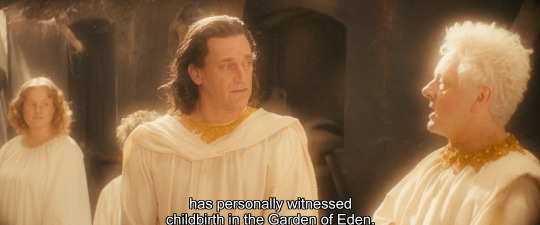
He is trying to tip the scales to get the outcome he wants - to keep this family safe - before he ever utters a lie. And then he does. He lies directly, giving his word as an angel. This is an act that eats him alive inside. He literally thinks he has fallen for this and has perfectly resigned himself as being damned to Hell for it and does it anyway. Because he knows it was right. Because he thinks a family of five he has no real connection to are worth falling to protect.

By the time we hit the Globe in 1601 Aziraphale's primary objection to their Arrangement has evolved from concern about what Head Office will think into concern specifically for Crowley's safety.
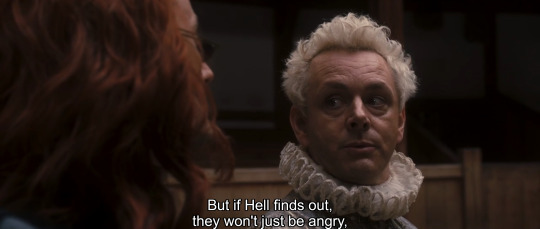

Then in 1827, even if it's in a misguided way, his concern starts out on Elspeth and her soul. He tries to protect her and very quickly changes his tune as soon as he's given proper evidence that what she was doing was net good. Again he is the one driving most of this narrative and the duo's actions forward as Crowley drifts along trying to get him to see that some actions aren't fully good or bad but can exist in a moral gray space. We also get him verbalizing his own moral code here explicitly when he wants to heal Morag.
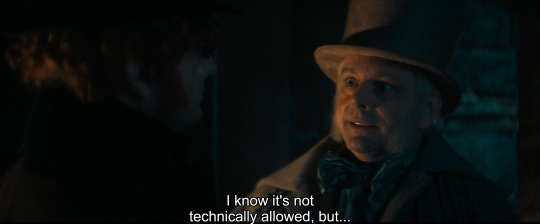
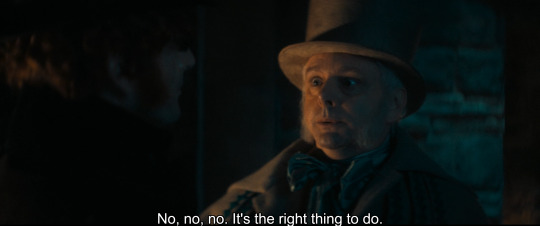
He continues to have concern for Crowley on the forefront of his mind - asking very quickly after his good deed for Elspeth if he's safe or if hell noticed and then a few years later denies Crowley holy water out of concern that it could destroy him.
In 1941 we first get him operating under cover trying to unsuccessfully lie his way into dispatching some Nazi. We then get him offering himself as a magician for Crowley's sake and using sleight of hand to keep evidence of their relationship from making its way to Hell.
In particular I want to draw attention here to the fact the episode we revisit this moment in has two very similar moments toward the beginning and end of it. This episode opens with what the episode is named for - Shax hitching a ride with Aziraphale. He's relatively amicable with her until she at one point implies harm to Crowley wondering out loud why he would risk destruction for Az. Then toward the end when Furfur enters the dressing room, Aziraphale is pleasant and kind until the moment it becomes clear Crowley is being threatened. In both cases his expression turns more neutral and his body language becomes more focused and serious. He is ready to protect at all costs and is done being polite to these people who threaten his demon.


From there we go to 1976. Here as he hears about Crowley's holy water heist, he makes a choice. Even though he does not want Crowley having this weapon at all and tells Crowley as much that that position hasn't changed he realizes how dangerous trying to steal it could be. So he decides to make it as safe as he can in the circumstance, putting aside his own wants and feelings for the sake of minimizing even potential harms.
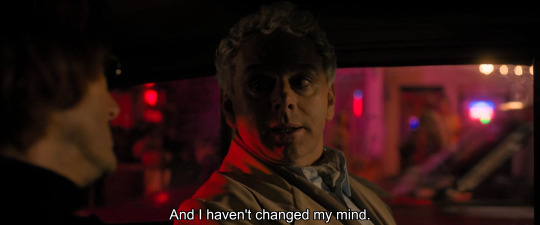
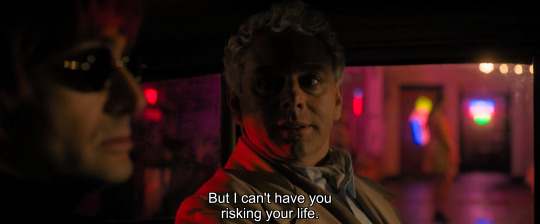
Even good old 'you go too fast for me' is a form of protection here. Even if it hurts and even if it's not want they want they need at least one of them to pump the breaks to make sure they are not discovered.
Then the world nearly ends. I won't examine what happens there too closely but I think we can all agree Aziraphale was willing to do quite a lot to insure the world and Crowley were safe once Crowley gets him on board with raising Warlock. Though I do want to note I don't think it's an accident that a lot of what Aziraphale says to Crowley at the end of six has echos of the bandstand - the last event Aziraphale has to reference that he knew would make Crowley go away.




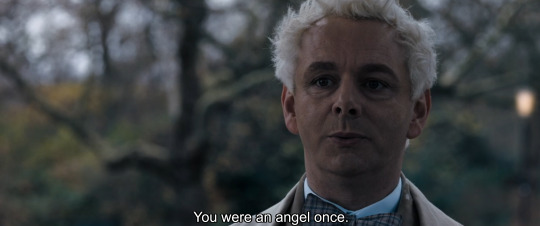
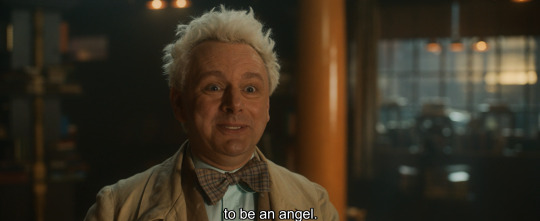
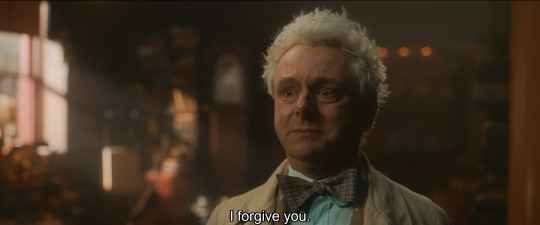

A lot of the core of the current season is built around all sorts of protective Aziraphale actions. The flashbacks all gesture at it in some capacity, and anther notable one is him sacrificing books both as weaponry and to make the ball happen. He has committed to securing their safety before a single demon even shows up looking for Gabriel. We also get him willingly risking war to defend the people in his shop. Episode six in particular shows us a lot of Aziraphale in this mode, which he's pretty much locked into from the moment the demons arrive, Whether it's protecting Gabriel, Nina and Maggie, or at one point putting his body between the demons and a whole crowd of people including Crowley.

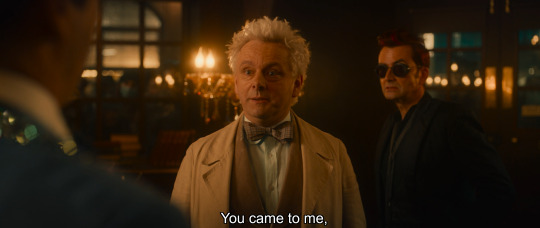
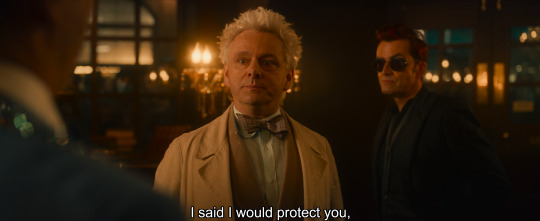

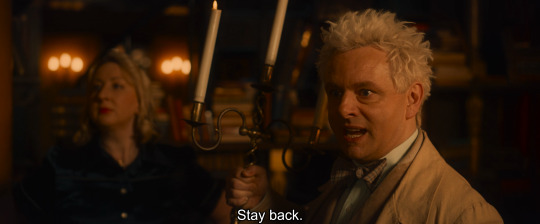
This season is a season that emphasizes that Aziraphale is a liar. It is one that draws attention to him pulling tricks and on him learning to do that for the greater good. It it about him learning that sometimes the choices we make are often more morally gray than we would like. And most importantly it is about Aziraphale believing this world and the people in it are worth protecting.
And who does he want to keep safe more than anyone? Who did he fight to share his life with? It makes sense to me that he would do this for Crowley. It's perfectly in character and gives Aziraphale the due credit I think a lot of theories lack. Because, to me, Aziraphale isn't the one that walks away from Omelas, Aziraphale is the child who would willfully sacrifice himself to keep the people he loves safe.
1K notes
·
View notes
Text
I’m so glad everyone is having the same visceral reaction to episode 4 like I did. I thought I was being too sensitive but fucking no. It is painful. It is horrid. Knowing that this type of abuse actively happens to sex workers and those who are trafficked. It’s jarring because I didn’t expect to see this dark and explicit depiction in a cartoon that jokes about penises every 2 minutes. It’s like when light hearted coco melon shows start talking about death, it was just unexpected because I never took this show serious. I’m going to share more of my thoughts below! Trigger Warning: Mentions of SA ⚠️
I don’t think it’s my place to deny or confirm if the ‘poison’ scenes were fetishized, I personally believe it’s subjective. I know how I feel but I think no matter where you stand, you are right in your own way. Many things can be true at once. What we can all agree on, is that it was harsh. In a way, I hope the audience is able to understand how exploiting and non glamorous sex work is. There is nothing fun about having your body used multiple times a day by people you do not know and having said scenes recorded then plastered all over the media. Of course all forms of engaging in or creating adult content are different, I am specifically talking about sex workers who have no say or control over their bodies and finances. Like Angel. Let us put emphasis on WORK in sex work.
It is demanding. It is laborious It is scaring. Remember that and remember the unheard voices who must do this to simply survive.
There is a lot of criticism about angel’s personality and yes I agree it is annoying but you have to understand, it is a trauma response. Hypersexuality is a common trait among those who are sexually abused. Angel just outwardly expresses it all the time because it is all he knows. This thought process is the only way to tolerate his behavior. I say thought process because it is only an interpretation. It’s very obvious viv just adores writing sexed up characters with zero nuance or depth but let’s just pretend she can actually write male characters that think beyond their cock and balls. Let’s pretend that Angel Dust is a two dimensional character and not (grits teeth) fetish bait.
Now, let’s talk about Charlie. Alright great, she saw her friend being mistreated and was about to stand up to his abuser, ok good good. The victim (Angel) gets upset and wants her to leave because he was beaten. Yes, average response of someone who is an abusive relationship, he is afraid and wants to avoid more conflict between him and Val. The situation at hand couldn’t be more than obvious. How does Charlie respond? She cries. And not because she is frustratedly concerned for the safety of her friend. It is because he yelled and rejected all her poor attempts at helping. Charlie is weak as shit and I think that interaction was weirdly written. I wish she had the mental fortitude to understand how much danger Angel’s life was in at that moment. I cannot enjoy her ‘aggressive kindness’ cutie do no wrong baby girl type of character in a moment like that.
And I feel the same about Husk’s song. Out of all the responses you could’ve made, this is what made it to the final cut? Do better. I don’t care if I lack the mEdIa LiTeRaCy twitter keeps yapping about. It’s bad. You just showed a sexual assault montage and the rebuttal was basically “my uncle broke his neck tap dancing once :/“ lol we’re both losers and that’s ok, suck it up buttercup, I like you regardless. This was the best response to an SA victim? No degree in media literacy would ever help me think that was an acceptable response. I dunno about ya’ll but I major in common sense at the university of using my eyes and fucking ears. Now imagine, if that entire segment, when Husk and Angel are at the bar plus the musical number; imagine if all of that was placed BEFORE we see Angel and Val interact and then poison plays as the final song. It would be 10x more impactful because then the audience sees how deep and stuck Angel actually is. Trauma olympics is never acceptable but neither is trauma participation trophies. It is not right to make Husk’s issues be seen as the same as Angel’s issues. They are not the same and it is ok to acknowledge that Angel has it worst than Husk. It’d be more genuine if Husk were to just hug him in complete silence after dragging him out of the bar and have Angel tearfully embrace him back. The first non sexual and benevolent interaction between them. The first physical act of care with no ulterior motives of lust.
I grind my teeth at the wasted potential.
#sorry for randomly dropping that trolls reference but it’s exactly what husk’s song felt like!#i hope my statement about sex workers didn’t come off as bashing anyone!!!#it’s just important to know it hard and can be extremely dangerous#don’t let some onlyfans girl with a pink wig trick you into thinking it’s fun just because she used her check to buy disney tickets or smth#sex work is (and i cannot stress this enough) WORK. LABOR.#anyways teehee thank you for reading!!!#anti vivziepop#anti hazbin hotel#vivziepop critical#vivziepop criticism#hazbin hotel critical#hazbin hotel critique#hazmat hotel#🍯
353 notes
·
View notes
Note
I wonder why christian misrepresentation are rarely talked about if compared to other religion misrepresentation. Like, I've seen people really vocal about Greek myths misrepresentation in LO and such (and it's valid because it's a culture and religion) but I rarely saw the same thing with christian even though there are many media who use christian religion innacurately, to the point where it comes off as using it as an aesthetic and not a proper religion.
Is it because of rampant religious trauma especially in western world? No ulterior motives on this question. I'm not a christian and yet I'm curious about this. I apologize if this sounds harsh.
I obviously don't have The Answer(tm) to this but personally speaking (and I'm about to get VERY personal here so take this with MOUNTAINS OF SALT), I think it's just the obvious - Christian mythology is one of the most well-documented and strongly protected out of virtually any other religion on the planet. Especially here in the West, it's commonplace for kids to go to Sunday school, for couples to have Christian weddings even if they're not practising Christians themselves, even the American anthem references the Christian God. It's simply not as easy to 'misrepresent' it because the representation is written into our very fabric of society. Even Greece itself is primarily made up of Orthodox Christians.
So anyone that does 'misrepresent' it are either completely mislead hardcore Christians, or people who are doing it intentionally, such as with the intent to make a parody of it or to deconstruct it through a different context or whatever have you. And of course, people will still get mad at those things, if you're implying that people aren't vocal about Christian misrepresentation then frankly IDK what to tell you there LOL If you want a contextual example in the realm of webtoons, Religiously Gay was dragged to hell and back during its launch for having a very crude and insulting depiction of St. Michael, and frankly, yeah I don't disagree because what the fuck is this-
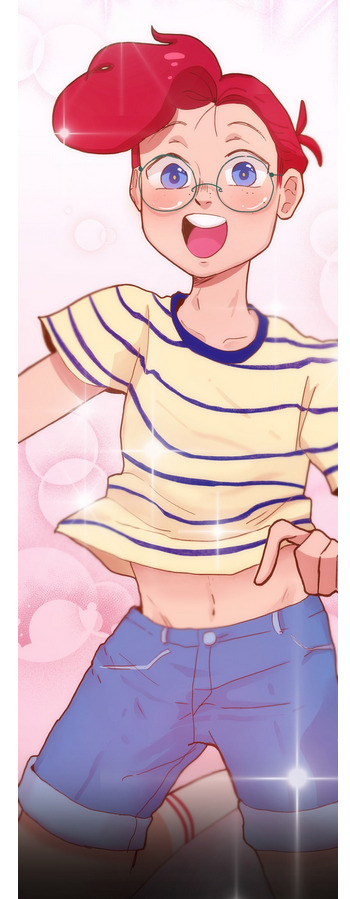
(like at best it's just terrible character design lmao that said, there's also plenty else to criticize Religiously Gay for, including its fetishy representation of gay relationships and the fact that it's still just the "naive person who looks and acts like a child hooks up with mean person in a position of power" trope, blech, but the character design is definitely the first thing you notice)
There are even plenty of hardcore Christians who will deadass claim "misrepresentation" over things that ARE factually correct but they just haven't read the actual Bible and simply cherry pick what works for their own agenda. And of course those people are routinely called out by people like myself who know for a fact that Jesus wouldn't have promoted the war crimes that many modern day Christians are committing and justifying today. So it really depends on the definition of "misrepresentation" here.
The issue specifically with LO and Rachel that I personally call her out for (and many others) is that she's called herself a "folklorist" and claimed she's so much more knowledgeable on Greek myth than anyone else, while making a complete mockery of the original mythologies while not being honest about her intent as to whether LO is actually supposed to be a legitimate retelling OR a parody (because it sure acts like the latter more than the former, but she still seems to expect us to take it seriously and consider her knowledge of Greek myth superior?) Which leads to a lot of her teenage audience claiming shit like "Persephone went down to the underworld willingly" and "Apollo did assault Persephone in the original myths actually" and the classic "why would Lore Olympus lie or make up fake myths?"

You just can't pull off this extent of erasure with Christian mythology because we have a whole ass book of it that's been preserved, sold on shelves, and systematically integrated into society for thousands of years. Of course, there are people who will still try their damned best to twist the Bible to match their own bigotry with the whole "Jesus hates gays" bullshit (he would never), but it's met with equal amounts of 'misrepresentation' that are actually fully well-read and are intentionally subverting and changing things to either critique, parody, or restore the original intent of a lot of stories in the Bible without all the manufactured right-wing crap.
Greek myth, on the other hand, has some stories that are well preserved, and others, not so much. And in the modern day outside of the poems and hymns, you'll also rarely, if ever, see anyone use stories from Greek myth to ostracize, torture, and murder other people. "Misrepresenting Christianity" is more often done by actual Christians who are using the Bible to commit hate crimes than the people who have actually read the Bible and are just taking creative liberties with it for the sake of deconstructing / parodying / analyzing / subverting it. Veggie Tales "misrepresents" Christian stories because obviously Moses wasn't a fucking cucumber lmao but it still accomplishes its goal by retelling Christian stories in a way that's fun and educational for children.
By comparison (on the whole, I'm not comparing LO to Veggie Tales LMAO) LO just isn't clear in its intentions beyond Rachel's initial statements that she was trying to "deconstruct" the myths, while labelling herself as a folklorist. Therefore, I'm going to criticize how she does it because the way she's done it up until now has been very mishandled and has resulted in a lot of misinterpretations of the myths simply for the sake of fandom. And yes, these people exist in Christian media as well - they're called TV evangelists.
And that's my (very heavy) two cents.
#here's your reminder that missionaries are colonizers#find me the Hellenistic pagans knocking on people's doors asking them if they want to hear about the glory of Aphrodite lmao#honestly it also depends on what you're surrounding yourself with#obv if you take part in the LO fandom and avoid what's going on in the christian world then what you experience and see will seem skewed#like even i could be very wrong in my opinion based on my own experiences as someone who lives in the west-#maybe there ARE pagans knocking on doors and using greek myth to commit hate crimes#so yeah we all gotta try not to fall for survorship bias#there are plenty of stories of people getting mad about christian mythology and its misrepresentations on BOTH sides#lo critical#lore olympus critical#anti lore olympus#webtoon critical#ama#ask me anything#anon ama#anon ask me anything
170 notes
·
View notes
Note
Sid, why do you think people think Kagome is “so annoying” and “whiny?” How exactly did she earn this reputation among her (rather dumb) haters.
The world is not kind to 15 years old girls, and what is Kagome, if not the perfect representation of one?
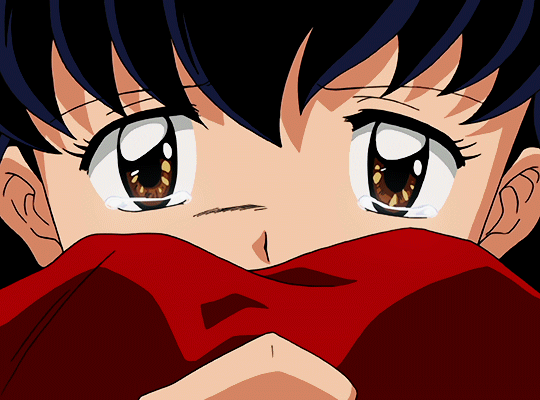
People forgot they can dislike a character just because and then move on. They'd rather grasp at straws to try and justify themselves, that way they can pretend they're being rational about the constant hate they're spreading when, truthfully, they're just being miserable.
Kagome specifically is in even greater disadvantage because her critics are, mostly, people who haven't read the source material and are instead basing their takes on a biased adaptation – which they probably watched ages before developping any critical skills – or people who see her as a threat to their ship and therefore are already prone to hate her.
The first group won't ever bother going out of their way to try and get a better grasp of her character by reading a 558 chapters long manga and the second group won't change their minds either way.
That's why they call her out for using the beads of subjugation even if: it wasn't her idea in the first place, it served to balance her relationship with Inuyasha at the beginning – since he was powerful and violent while she wasn't –, the rosary became a symbol of their bond, it saved Inuyasha a couple of times and he was always more annoyed than hurt by it, not to mention Sunrise blowing it out of proportion compared to the manga.
You never see Inuyasha getting bashed for hitting Shippo every other episode or Sango getting any heat for constantly slapping Miroku, because funnily enough people seem to understand it was just dumb, outdated, slapstick comedy, a courtesy they refuse to extend to Kagome.
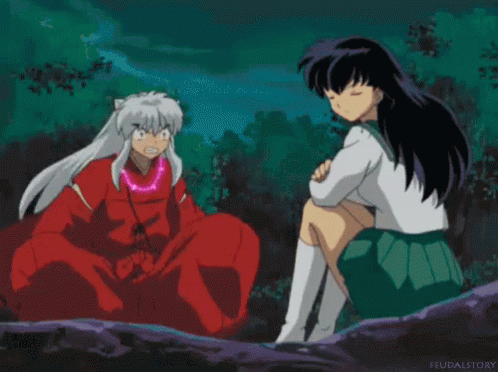
That's also the reason they call her “annoying” and “whiny”: Kagome’s most important lesson was that it's okay to have feelings, so naturally they twisted that into a bad thing in order to keep hating on her. It's not about how her character was written, it's about people using of bad faith and deliberately mischaracterizing Kagome to pass their internalized misogyny as valid criticism.
I know part of the issue is that audiences nowadays are under the impression that for a female character to be strong, she can't cry or be feminine, but you don't see anyone hating on Sango even though she does cry and she can be as feminine as Kagome depending on the circunstances and on her mood.
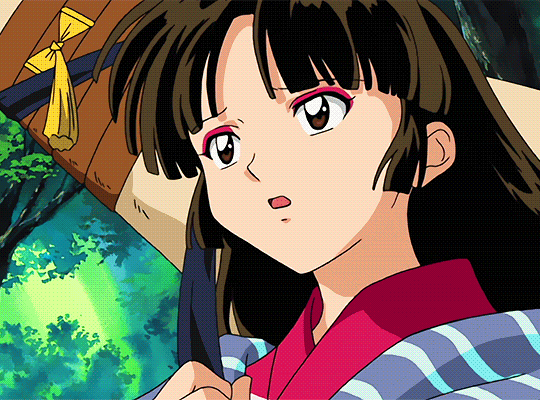
The truth is that Kagome is playing a game she can never win, because the refs have decided they want her to lose before the match even starts.
If she stands up and sets boundaries for herself, she's annoying. If she doesn't, she's a doormat. If she feels jealousy, she's a bitch. If she shows kindness, she's boring. If she fights, she's overpowered. If she doesn't, she's useless. If any other character cries, it's heartbreaking. If she cries, she's whiny.
If she goes back to her own world, she's selfish. If she leaves that world behind to live the life she wants for herself, she's a stupid girl who left her family for a boy. If she does something grand, that's only because she's someone else's reincarnation. If she messes something up, the fault is hers and hers alone. She is, somehow, simultaneously a Mary Sue and a toxic abuser.
I've personally seen people slut shaming her because she got hitted on by Koga. I've personally seen people call her a "pick me" girl. Kagome. A pick me girl. Kagome.
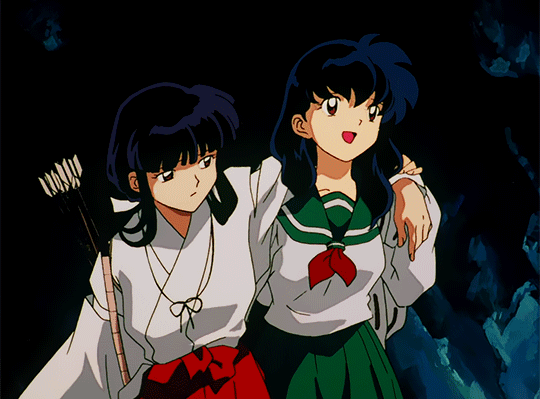
And none of this is fair, because she is the kind of character who does her best to see the good in others, to understand the reasons why they act the way they do and to offer them some grace, but she gets very little of that in return, be it in canon, be it in fandom.
They always hold her up to such an impossible standard, but they completely forget to ask themselves: would the characters I stan be able to match the expectations I set for Kagome? Scratch that: would the characters I stan even be able to deal with things the way Kagome managed to do? Would I? The answer is most likely no, so how about cutting her a slack?
You ask me how did she earn this reputation among her rather dumb haters, my answer is: she didn't. They're just incapable of understanding that if a particular nuanced, well written, female character is not their cup of tea, they can simply ignore her and focus their attention on the characters they do like instead of spreading their baseless, misogynistic takes on the internet.
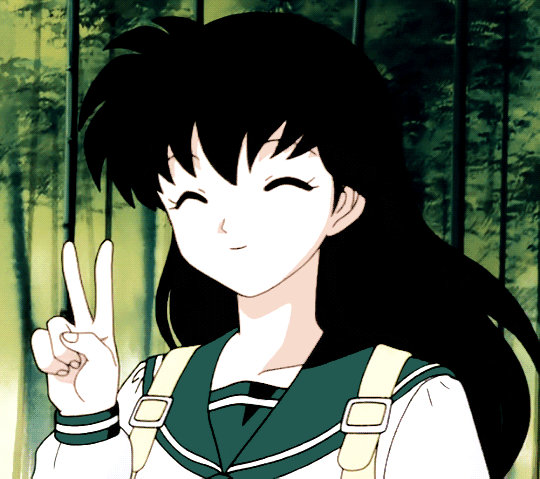
#I also feel like there's this trend of disliking protagonists in general#But I won't elaborate because this is already longer than I wanted it to be#And it applies to most of protagonists so it isn't Kagome specific#It's a dicussion for another day#Inuyasha#Kagome#Kagome Higurashui#Thank you for the ask anon#Sidmailing
161 notes
·
View notes
Text
as an extension of how hera reads as trans to me, hera/eiffel resonates with me specifically as a relationship between a trans woman and a cis man. loving hera requires eiffel to decentralize his own perspective in a way that ties into both his overall character arc and the themes of the show.
pop culture is baked into the dna of wolf 359, into eiffel’s worldview, and in how it builds off of a sci-fi savvy audience’s assumptions: common character types, plot beats, or dynamics, why would a real person behave this way? how would a real person react to that? eiffel is the “everyman” who assumes himself to be the default. hera is the “AI who is more human than a lot of humans,” but it doesn’t feel patronizing because it isn’t a learned or moral quality; she is a fundamentally human person who is routinely dehumanized and internalizes that.
eiffel/hera as a romance is compelling to me because there is a narrative precedent for some guy/AI or robot woman relationships in a way i think mirrors some attitudes about trans women: it’s a male power fantasy about a subclass of women, or it’s a cautionary tale, or it’s a deconstruction of a power fantasy that criticizes the way men treat women as subservient, as property. but what does that pop culture landscape mean in the context of desire? If you are a regular person, attracted to a regular person, who really does care for you and wants to do right by you, but is deeply saturated in these expectations? how do you navigate that?
I think that, in itself, is an aspect of communication worth exploring. sometimes you won’t get it. sometimes you can’t. and that’s not irreconcilable, either. it’s something wolf 359 is keenly aware of, and, crucially, always sides with hera on. eiffel screws up. he says insensitive things without meaning to. often, hera will call him out on it, and he will defer to her. in the one case where he notably doesn’t, the show calls attention to it and makes him reflect. it’s not a coincidence that the opening of shut up and listen has eiffel being particularly dismissive of hera - the microaggression of separating her from “men and women” and the insistence on using his preferred title over hers. there are things eiffel has just never considered before, and caring for hera the way he does means he has to consider them. he's never met someone like hera, but media has given him a lot of preconceptions about what people like her might be like.
there’s a whole other discussion to be had about the gender dynamics of wolf 359, even in the ways the show tries to avoid directly addressing them, and how sexual autonomy in particular can’t fully be disentangled from explorations of AI women. i don’t think eiffel fully recognizes what comments like “wind-up girl” imply, and the show is not prepared to reconcile with it, but it’s interesting to me. in the context of transness (and also considering hera’s disability, two things i think need to be discussed together), i think it’s worth discussing how hera’s self image is at odds with the way people perceive her, her disconnect from physicality, how she can’t be touched by conventional means, and the ways in which eiffel and hera manage to bridge that gap.
even the desire for embodiment, and the autonomy and type of intimacy that comes with it, means something different when it’s something she has to fight for, to acquire, to become accustomed to, rather than a circumstance of her birth. i suppose the reason i don’t care for half measures in discussions re: hera and embodiment is also because, to me, it is in many ways symbolically a discussion about medical transition, and the social fear of what’s “lost” in transition, whether or not those things were even desired in the first place.
hera’s relationship with eiffel is unquestionably the most supportive and equal one she has, but there are still privileges, freedoms, and abilities he has that she doesn’t, and he forgets that sometimes. he will never share her experiences, but he can choose to defer to her, to unlearn his pop culture biases and instead recognize the real person in front of him, and to use his own privilege as a shield to advocate for her. the point, to me - what’s meaningful about it - is that love isn’t about inherent understanding, it’s about willingness to listen, and to communicate. and that’s very much at the heart of the show.
#wolf 359#w359#doug eiffel#hera wolf 359#hera w359#eiffera#i still have a lot more to say about this honestly. but i hope this makes sense as an overview of my perspective.#with the caveat that i understand how personal trans headcanons are and whatever brings you comfort in that regard. i think is wonderful#but to me eiffel is one of the most cis men imaginable. and that's a big part of what he means to me in this context.#when i said some of this to beth @hephaestuscrew the other day they said. minkowski missteps in talking to hera based on#a real world assumption about AIs while eiffel missteps based on pop culture assumptions. and i think that's a meaningful distinction and#is something that resonates with me in this context as well
315 notes
·
View notes
Text
What No One Tells You About Writing #5
Part 4
Part 3
Part 2
Shorter list this time, but longer points. I expect this one to be more divisive, but it is what it is, and this is what ‘no one tells you’ about writing, after all. This one’s all about feedback and how to take it, and give it.
1. Not everyone will like your book, no matter how good it is
I’ve said this before, granted, but sometimes you can have very arbitrary reasons for not liking an otherwise great story. For example: I refuse to watch Hamilton. Why? Because everyone I knew and their dog was trying to cram it down my throat when it came out and I still don’t really like musicals, and didn’t appreciate the bombardment of insisting I’ll like it simply because everyone else does. I’m sure it’s great! I’m just not watching it until I want to watch it.
It can be other reasons, too. I won’t read fanfic that’s written in first person, doesn’t matter how good it is. Someone might not watch a TV show because the primary cast is white or not-white. Someone might not watch a movie because an actor they despise is in it, even if the role is fantastic. Someone might not watch or read a story that’s too heavy on the romance, or not enough, or too explicit. I went looking for beta readers and came across one who wouldn’t touch a book where the romance came secondary in a sci-fi or fantasy novel. Kept on scrolling.
Someone can just think your side character is unfunny and doesn’t hear the same music as everyone else. Someone can just not like your writing style with either too much or not enough fluff, or too much personality in the main narrator. Or they have triggers that prevent them from enjoying it the way you intend.
How someone expresses that refusal is not your job to manage. You cannot force someone to like your work and pushing too hard will just make it worse. Some people just won’t like it, end of story.
2. Criticism takes a very long time to take well
Some people are just naturally better at taking constructive criticism, some have a thick skin, some just have a natural confidence that beats back whatever jabs the average reader or professional editor can give. If you’re like me, you might’ve physically struggled at first to actually read the feedback and insisted that your beta readers color-coded the positive from the negative.
It can be a very steep climb up the mountain until you reach a point where you know you’re good enough, and fully appreciate that it is actually “constructive” and anything that isn’t, isn’t worth your time.
The biggest hurdle I had to climb was this: A criticism of my work is not a criticism of me as a person.
Yes, my characters are built with pieces of my personality and worldview and dreams and ideals, but the people giving you feedback should be people who either already know you as a person and are just trying to help, or are people you pay to be unbiased and only focus on what’s on the page.
Some decisions, like a concerning moral of your story, is inadvertently a criticism of your own beliefs—like when I left feedback that anxiety can’t just be loved away and believing so is a flawed philosophy. I did that with intent to help, not because I thought the writer incompetent or that they wrote it in bad faith.
I’m sure it wasn’t a fun experience reading what I had to say, either. It’s not fun when I get told a character I love and lost sleep over getting right isn’t getting the same reception with my betas. But they’re all doing it (or at least they all should be doing it) from a place of just wanting to help, not to insult your writing ability. Even if your writing objectively sucks, you’re still doing a lot more just by putting words on paper than so many people who can’t bring themselves to even try.
As with all mediums subjects to critique, one need not be an author to still give valuable feedback. I’m not a screenwriter, but from an audience’s standpoint, I can tell you what I think works. Non-authors giving you pointers on the writing process? You can probably ignore that. Non-authors giving you pointers on how your character lands? Then, yeah, they might have an opinion worth considering.
3. Parsing out the “constructive” from the criticism isn’t easy
This goes for people giving it as well. Saying things like “this book sucks” is an obviously useless one. Saying “I didn’t like this story because it was confusing and uncompelling” is better. “I think this story was confusing and uncompelling because of X, and I have some suggestions here that I think can make it better.”
Now we’re talking.
Everyone’s writing style is different. Some writers like a lot of fluff and poetic prose to immerse you in the details and the setting, well beyond what you need to understand the scene or the plot. Their goal is to make this world come alive and help you picture the scene exactly the way they see it in their minds.
There’s writers who are very light on the sensory fluff and poetry, trying to give you the impression of what the scene should look and feel like and letting you fill in the missing pieces with your own vision.
Or there’s stories that take a long time to get anywhere, spending many pages on the small otherwise insignificant slice-of-life details as opposed to laser-precision on the plot, and those who trim off all the fat for a fast-paced rollercoaster.
None of these are inherently bad or wrong, but audiences do have their preferences.
The keyword in “constructive criticism” is “construct”. As in, your advice is useless if you can’t explain why you think an element needs work. “It’s just bad” isn’t helpful to anyone.
When trying to decide if feedback has merit, try to look at whatever the critic gives you and explain what they said to yourself in your own words. If you think changing the piece in question will enhance your story or better convey what you’re trying to say, it’s probably solid advice.
Sometimes you just have to throw the whole character out, or the whole scene, whole plot line and side quest. Figuring out what you can salvage just takes time, and practice.
4. Just when you think you’re done, there’s more
There’s a quote out there that may or may not belong to Da Vinci that goes “art is never finished, only abandoned.” Even when you think your book is as good as it can be, you can still sleep on it and second-guess yourself and wonder if something about it could have been done better or differently.
There is such a thing as too much editing.
But it also takes a long time to get there. Only 10-15% of writing is actually penning the story. The rest is editing, agonizing over editing, re-editing, and staring at the same few lines of dialogue that just aren't working to the point that you dream about your characters.
It can get demoralizing fast when you think you’ve fixed a scene, get the stamp of approval from one reader, only for the next one to come back with valid feedback neither of you considered before. So you fix it again. And then there’s another problem you didn’t consider. And then you’re juggling all these scene bits and moments you thought were perfect, only for it to keep collapsing.
It will get there. You will have a manuscript you’re proud of, even if it’s not the one you thought you were going to write. My newest book isn’t what I set out to write, but if I stuck to that original idea, I never would have let it become the work that it is.
5. “[Writing advice] is more like guidelines than actual rules.”
Personally, I think there’s very few universal, blanket pieces of writing advice that fit every book, no exceptions, no conditions, no questions asked. Aside from: Don’t sacrifice a clear story for what you think is cool, but horribly confusing.
For example, I’m American, but I like watching foreign films from time to time. The pacing and story structure of European films can break so many American rules it’s astonishing. Pacing? What pacing? It’s ~fancy~. It wants to hang on a shot of a random wall for fifteen seconds with no music and no point because it’s ~artsy~. Or there is no actual plot, or arc, it’s just following these characters around for 90 minutes while they do a thing. The entire movie is basically filler. Or the ending is deeply unsatisfying because the hoity-toity filmmaker believes in suffering for art or… something.
That doesn’t fly with mainstream American audiences. We live, breathe, and die on the Hero’s Journey and expect a three-act-structure with few novel exceptions.
That does not mean your totally unique or subversive plot structure is wrong. So much writing advice I’ve found is solid advice, sure, but it doesn’t often help me with the story I’m writing. I don’t write romance like the typical romance you’d expect (especially when it comes to monster allegories). There’s some character archetypes I just can’t write and refuse to include–like the sad, abusive, angsty, 8-pack abs love interest, or the comedic relief.
Beyond making sure your audience can actually understand what you’re trying to say, both because you want your message to be received, and you don’t want your readers to quit reading, there is an audience for everything, and exceptions to nearly every rule, even when it comes to writing foundations like grammar and syntax.
You don’t even have to put dialogue in quotes. (Be advised, though, that the more ~unique~ your story is, the more likely you are to only find success in a niche audience).
Lots of writing advice is useful. Lots of it is contradictory. Lots of it is outdated because audience expectations are changing constantly. There is a balance between what you *should* do as said by other writers, and what you think is right for your story, regardless of what anyone else says.
Just don’t make it confusing.
—
I just dropped my cover art and summary for my debut novel. Go check it out and let me know what you think!
#writing advice#writing resources#writing tips#writing tools#writing a book#writing#writeblr#editing#constructive criticism
113 notes
·
View notes
Text
There were a few incredible decisions regarding mechanics from Spenser this past episode that I wanted to highlight.
The first is obviously the choice to have Sean's decision take place behind the curtain. We've seen this used a few times on Critical Role by Matt; but it's been in front of the audience, away from the other players (most notably Vax's choice with the Raven Queen, but this has also been used for some of the Mighty Nein's interactions early on, and for Yu's conversation with Zathuda). It's apt for a horror series; the tension is derived not just from the other players not knowing Sean's position, but also from the audience being unaware.
The second is the decision to have Sean's roll to navigate the underwater tunnel be hidden from the other players, but not the audience. It's important that the other players make their decisions without knowing if Sean was successful, but it's fine if the audience knows as it's not part of the larger mystery.
I don't necessarily think it's a strength or weakness of many TTRPGs that players above the table have information their characters might not have access too; the metagame is still part of the game, and truthfully, the players still knew that Sean had been offered a choice whereas their characters knew nothing of it. Because of the limitations of the medium - you only know what you are told by the GM or by other players, who may not think to narrate every little potential tell - I would even argue that a well-run game allows room for a little metagaming to make up for that significant gap between the truth of the story and what the characters are "supposed" to know. But I also think it is important to allow some surprises and reveals to be genuine, and in a GM-ed (as opposed to GM-less) horror game with complex character relationships that does require concealing some player/GM interactions.
The third was the resolution of the two PVP moments. The first, between Jean and Sean, defines a turning point. It's Jean's realization that Sean is compromised. A success, for each of these characters, represents them surviving so that they can carry out their as of yet unrealized goals in the scene; they are shooting to prevent the other from stopping them from doing so. It's better to keep living having missed than die having hit. And so with the sixes they roll, they miss each other but both have the information they need to make their next decisions.
On the other hand, the second moment, between Sean and Bee, is a desperate last-ditch attempt. Neither of them expect to survive the encounter, and both make this clear in their narration. Sean just needs to make it so Bee's soul can be taken, even at the cost of his own life. Bee, meanwhile, is not trying to save herself, but is simply trying to stop Sean so that Jean can close the rift without his interference. A success is the realization of these goals, even at the cost of their own lives; it's better to die having taken down the other than live with the other having escaped.
I think this is a masterful example of understanding player goals and finding a way for the mechanics to support it, because this is, ultimately, a standard roll for each character involved that simply happens to affect another character instead of something controlled by the GM. A lot of people can get very caught up in rules as written and neglect that often, written rules still allow a certain degree of space for the GM and for the players, and stepping back and understanding the purpose of the scene lets everyone find a satisfactory resolution quickly and tell the story instead of going down rules rabbit holes.
225 notes
·
View notes
Note
I had a long argument with someone on whether or not stomping Belos before he dies was better than letting him die pathetically, and I asked myself if that is what fans really believe in... or if they would hail any Belos' death as the perfect one if Dana choose a different one?
They also justify the stomping as being part of horror-comedy genre and that Belos should not have any dignity what so ever because apparently letting him die in despair with no stomping is running the risk of making the audience feel "sorry" for him.
Honestly, these justifications make The Owl House feel more shallow. Like, why shouldn't the audience be allowed to feel sorry for Belos? What is the danger? That people would agree with Belos' views?
Or are we supposed to develop a black and white view of the world akin to a conservative view but inverted? And then hide behind the horror comedy genre to justify less drama? I hate to say it, but Nostalgia Critic is right about Belos being this strange outlier. The show seems to be afraid of actually doing a complex, tragic and yet irredeemable villain.
It doesn't make any sense to argue that Belos' death fits because of toh's genre as a horror comedy because the scene was neither played for horror nor laughs. At best, you have the image of Philip slowly being dissolved by the rain and then Raine's smug "that was satisfying" line. The overall tone of the scene is one of contempt as Philip tries one last plea to Luz only to be snuffed out (and weirdly validated) by the heroes. Its intent is to be cathartic for both audience (though as you know doubt know, YMMV) and the characters.
Frankly, despite its marketing, I don't see toh as either a horror or a comedy because it spends more time on slice of life stuff and high school teen drama and romance. And even when it does go for the horror and comedy, both are rather tepid. You want a real example of a horror-comedy for kids, then go watch Courage the Cowardly Dog or Invader Zim.
The reason why I argue the heroes validated Belos is because in the moment of his death, he clings to the idea that as humans, "we're better than this!" It's a moment of pathetic delusion that is appropriately met with silence but then it's ruined with Eda and Co. barging in with "Well, we ain't!" only to then prove his point by mercilessly stomping an already dying man to death. There's a reason why kid shows usually end with either the villain being imprisoned or not outright being murdered by the heroes. Evil has to die by its own hubris, not get killed by the heroes after the Big Battle when they're no longer a threat. I made a post about the importance of defeating a major antagonist twice.
Belos' death also doesn't work with a "Kill your oppressors" theme because the show isn't about that. The show barely spends any time showing why the EC is bad for the Boiling Isles and Eda is the only named wild witch we see getting harassed by them and even then, it's mostly played for laughs given how inept the coven scouts are (seriously, they're able to quit without fear of repercussions).
I think a reason fans are split on Belos' death is because of differing expectations; the fans who paid attention to Belos and the implication of his backstory and waited for every lie to come crashing down on him since that's what the show seemed to be building up to only to be unceremoniously ignored in the end were no doubt disappointed. Then you have the other fans who hated the character to the point that any gruesome death will do, regardless whether it made narrative or thematic sense or not.
Ultimately, I think the biggest reason his death doesn't work is because Belos fails as a villain.
Belos' status as a colonial puritan only works on a meta-level; it serves a cathartic release for marginialized people to see a representative of real world oppression beaten by queer characters as it fulfills the fantasy of finally overthrowing an oppressive system. The fatal flaw though is that none of this works on a narrative level because the coven system is either treated as a joke or simply a career path one must choose and we never see the disenfranchisement of wild witches. People largely get off scot-free opposing Belos, which undermines his credibility as both a dictator and a villain because no one cares about him until the plot needs them to. Luz doesn't even care about proving he's evil until Hollow Mind, which is halfway through season 2.
Belos as a villain only works if you project your own feelings and desires in wanting to see the Evil Christian/Evil Parent destroyed. While this is extremely satisfying emotionally, it does not make a sound story.
All the reasons why people like his death ("it's great the evil colonizer died so pathetically!" "omg, the white christian colonizer was killed by two queer people and their adopted son!" etc) are all meta reasons. And to be clear, it's totally fine if you thought his death was satisfying. But for many people, it did not work for a variety of reasons, including narrative ones. And that differing opinion should be respected instead of arguing some nonsense like "we have to make our villain as stupid/evil as possible or run the risk of people liking/sympathizing with him."
Belos should have died in a manner that connected back to his original sin: the murder of his brother. All of his lies and delusions and fear of being wrong should have played a part in the finale. He should have not died thinking he was right. He should have died realizing that all he did was for nothing. And that he is to blame. And that there is no one waiting for him back home.
120 notes
·
View notes
Text
Did Harvey just reveal Guillermo’s season 6 ending?
Critics Choice Awards, Deadline. 2024.
S6 speculation below:
…I think the best thing I can take from playing Guillermo De la Cruz is it's never too late to find yourself. It's never too late to be reborn and to reinvent yourself. And there’s no ticking time bomb expiration date to anyone of us to what our dreams and hopes can come true…Well,we start where we left off, and sometimes dreams and aspirations don't turn out the way we want them to...but I think that that's the whole point of rebirth,right? It's like a renaissance. It's happening again. And you take a new direction, new ideas, a new approach. So I'm really excited for the audience to see a new layer to Guillermo.
These are the key words from Harvey’s interview:
1. it's never too late to find yourself
2. Reborn
3. Reinvent
4. Ticking time bomb
5. Expiration date
6. Rebirth
7. Renaissance
8. Happening again
9. New layer
There’s a lot of references to reinvention and rebirth as well as time and hopes and dreams.
We know that Guillermo’s dream of being a vampire ended in season 5 when he learned that he couldn’t go through with killing humans.
There’s a stress of new ideas and directions, which sounds like Guillermo’s ending will not be any of the things he has been already: familiar, bodyguard, slayer, vampire.There’s going to be a new direction for Guillermo that he possibly hasn’t considered.
There’s a huge focus on time and rebirth, Harvey points out this message several times in the interview. He repeats and emphasizes reinvention and renaissance. Almost like being born again.
And the show has accomplished something like what Harvey has mentioned. Something that is technically not a new idea at all. And that’s energy vampires.

Energy Vampires life expectancies are a ticking time bomb. They have an expiration date. They live only for 100 years. And on that 100th birthday, they expire.
Except, they don’t expire. They give birth to a baby version of themselves and are basically born again or undergo a rebirth.
A storyline that was hinted at by not yet fully explored is the creation of the energy vampire. We know how they die and how their life cycles begin again, but we don’t know how they are made.
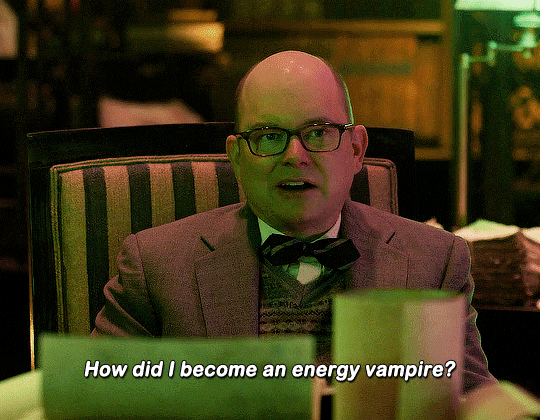
And I believe this is the season we find out. And Colin will help Guillermo by helping him turn.
I revisited some parts of season 5 when I considered this. Namely:
1. Guillermo’s inability to kill
2. That he didn’t want to say goodbye to his mom
3. That he said he still wanted to be a vampire
Becoming an energy vampire solves all three.
Guillermo can still see his mom without the threat of her killing him. He also doesn’t have to feed on humans in the traditional way, namely he doesn’t need to kill. And this way he will live forever, even though he will die every 100 years.
I get how this may not be what we want or expect. I, probably like you, want to see Nandor sink his teeth into Guillermo more than anything. But I don’t think they want to give us that…at least not easily.
I do have a full theory on how we get to have Nandor turn Guillermo. But I will make that into its own separate post.
#what we do in the shadows#WWDITS#WWDITS s6#WWDITS theory#wwdits meta#harvey guillen#guillermo de la cruz#colin robinson
145 notes
·
View notes
Note
I know you said you're cautiously optimistic about HS2, but the newest blog post has me kinda worried. The talk of "fixing the fans broken trust" and how even the new writers don't like a lot of story decisions that were made by the old team seem really off to me, like it's throwing the old team under the bus. I want to expect good things from HS2 but when the people working on it don't seem to like the story as it stands right now it really just seems like they might bend over backwards to appease the shitty side of the fandom. What do you think about this whole thing?
this is in reference to the october 30th 2023 news update on the hs:bc website. i give the date because the news posts don't seem to have individual links atm, so if you're reading this in the future you might have to scroll back.
to your worry that the new team might bend over backwards to appease the shitty side of the fandom, i wrote at length in my prior hs:bc post about why i don't think that's gonna be a problem. i'd also caution against reading too much into what james says about the attitude of the hs:bc team at large, for reasons that should be apparent by the end of this post.
i think it's perfectly reasonable to take a diplomatic position towards a fandom that is historically very hostile to this continuation. a lot of people haven't read the epilogues/hs2 and hate on them anyway because of what they've been told they contain, and refuse to question those received opinions on principle. many who did read them seem to have been inattentive or otherwise needlessly aggressive, sometimes owing to a baffling refusal to accept the premise of postcanon. plenty of others maybe just need a reason to think that homestuck is for them again. for this project to succeed, the fandom at large needs to be given a reason to revisit the epilogues/hs2 from a position of safety and critical distance. i have my own barbed opinions about this state of affairs, but it is what it is.
i understand and to an extent share your misgivings over that Q&A post, but it simply is not james roach's job to relitigate the conduct of the hs2 team. to even broach the subject in more than a general sense would constitute the opening of a massive can of worms, because the truth is muddy. mistakes were made on all sides, some worse than others, and to really contextualize where the hs2 team were coming from you'd need to explain the history of the hs fandom, the leadership of the reddit/discord, the overall tenor of twitter post-2016 and especially leading into/during 2020, the history of pgen and the homestuck renaissance, the lack of PR training or oversight or guidance from anyone at WP, the history of audience hostility in homestuck, and on, and on. for what it's worth, i think that context is essential-- but i don't know that anyone working on this project ought to be the ones to tell it (nor do i think they want that responsibility), and a brief casual Q&A post as a halloween treat is certainly not the place to publish it.
and ultimately, none of that has much at all to do with hs:bc. they are not beholden to or responsible for the choices made by the hs2 team. they have been entrusted with the reins of this story, and with that trust comes their own admitted desire to take it in different directions than what was initially planned. the hs2 team did this to the outline andrew hussie gave them; it's only fair that the hs:bc team has the same leeway over the outline they inherited. acknowledging fault in prior leadership, admitting disagreement over past creative decisions, is an olive branch to a largely skeptical fandom. i bristle at some of this because the hs2 team were my friends and i'm very protective of their work and that moment in history, but that isn't james roach's (nor the hs:bc team's) cross to bear. his choice, as the new public face of homestuck, is to move forward rather than linger on the past. it's good that he's burying the hatchet, frankly. i'm sick of that fucking thing.
love it or hate it, agree or disagree, the hs:bc crew has to exercise diplomacy right now. they've reopened the patreon and want to sustain this project for the foreseeable future, ideally without subjecting the workers to intensely traumatic levels of scrutiny and harassment. this involves clearing up miscommunications, admitting fault, gesturing at shared disagreements over story direction, and otherwise putting on a friendly face for strangers. and let's be clear, i know for a fact that plenty on the original hs2 team had a panoply of disagreements with the choices made in the epilogues! the operative condition here is not unquestioning devotion to / hatred of prior material, but a willingness to build upon that prior material constructively regardless. that's what matters most to me, and i have every reason to believe they're taking the constructive route.
i'll end this saying what i've been saying from the start. the measure of this project's success or failure should be taken in the work itself. if james roach blanket dismissed the prior team, but hs:bc constructively evolved in a way that didn't invalidate or undercut prior material, i'd still consider us oldschool hs2 fans the winners. i wouldn't be HAPPY about it, but the art is what we're all here for, and it's the art that people will remember. i think often about how the showrunners of the tv series LOST insisted from day one until the very end that everything in the show had a scientific explanation, despite the fact that they *always knew* this was a bald-faced lie. they told this lie because ABC did not want to fund a fantasy show and would've canceled it otherwise. some fans to this day decry the lack of scientific explanations in the text of the show, even when you point out that the promise of such explanations was false from the start.
point is, there are material realities to leading a creative enterprise. james roach has put himself in a genuinely dangerous and scary position, a fact that's easy to forget with how casual and welcoming his posts have been thus far. but this is perhaps the single most mismanaged property of the internet age, and there's no walking that back without stepping on some toes. over-correction is expected and probably necessary. if it ruffles your feathers, that's fine-- but let the work speak for itself, and judge it on its own merits. all this other stuff is ancillary and will inevitably fade into the distant fog of time.
159 notes
·
View notes